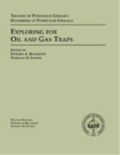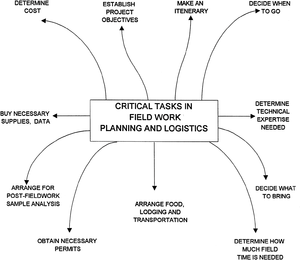Preparing to go to the field
| Exploring for Oil and Gas Traps | |

| |
| Series | Treatise in Petroleum Geology |
|---|---|
| Part | Predicting the occurrence of oil and gas traps |
| Chapter | Value of geological fieldwork |
| Author | Denise M. Stone |
| Link | Web page |
| Store | AAPG Store |
Planning and logistics are key components for the success of any field party.
Reviewing previous work
An important pre-field step is to review previous work. This includes finding and evaluating previous geological fieldwork, learning about the formations in the study area—even driving the seismic lines or flying over the area.
What to look at
Before going into the field, determine the scale of the objectives and examine geologic maps and remote-sensing imagery. Finally, evaluate the quality of the outcrops.
Be prepared
Remember the old scouting motto, “Be Prepared.” Know where you are going, identify potential problems, and devise a way to stay in touch with your colleagues in the office.
Know the study area
Learn the basics about the local area, including customs, language, and food, if different from your own. In central Africa, laughing is considered a sign of embarrassment; in Saudi Arabia, crossing your legs and exposing the soles of your shoes is considered rude. Read up about the distinguishing cultural traits of the area you will visit.
Get the necessary permissions
Obtain the necessary permissions from owners and/or authorities to access land or airspace. It's a good idea to get permissions in writing and carry them with you.
Identify potential hazards
Identify potential hazards in the field. These include wildlife, hunters, military maneuvers, minefields, and ordinance depots.
Carry first aid equipment and a snake bite kit, and know where to get the nearest medical help. Also be sure you know any specific medical conditions of your team members, such as allergies to food, medicines, or insects. Be sure that all members of the field party have the physical fitness required to do the work.
Stay in touch with the office
Have a plan for staying in communication with the office while you are in the field. Staying in communication is critical, particularly if the field work is done in a remote, unpopulated area. Periodic contact will allow for status reports, idea sharing, and help in the event of injury or emergency. Also plan for a way that members of the field party can be reached.
Final reminders
The following items are very important but easy to overlook. Remembering them will make your job easier and possibly more productive.
Have a sampling strategy
Answering questions like the following before you travel to the field is essential. Plan ahead as much as possible.
- What samples need to be collected and for what purpose?
- Who will collect the samples, and how should the samples be selected?
- Will weathering of samples be a factor?
- Will multiple sets of samples be taken for analysis? If so, how many?
- In what containers should samples be transported (bags, jars, etc.)? Will any special precautions be necessary to prevent breakage or contamination?
Seek out anomalies
Seek out anomalies such as seeps, hot springs, and topographic irregularities. Why do these occur where they do? What do they describe about the geology of your area? Do they pose questions to be answered?
Use analogs
If your basin is offshore or has poor to no outcrops, all is not lost. Is there an analogous area or formation to use as a predictive model or guide for interpretation? Will a modern or ancient analog be more useful?
Also, use “classic localities” worldwide in your quest for data. For example, if carbonates are your exploration target, the modern reefs in the Bahamas or the ancient Permian reef complex of West Texas could be a valuable guide to interpretation.
Analogs are worthwhile even if your study area is rich in outcrops. What other geologists have learned about areas similar to yours can help guide study or save work.
